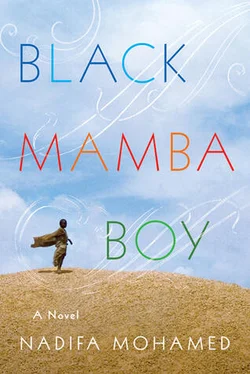“I have to go to Bethlehem, what can she be living on? I didn’t leave her any money.” Jama embraced Jibreel. “But I’ve taken the Ferengis’ money, they’ll make me go to Canada,” he cried.
“You’ve signed on for another ship?”
“Yes, it’s leaving this week, they know my name, where I live, everything, they fingerprinted me!”
“Settle down, we’ll sort something out.”
Jama hid his face in his palms, imagining Bethlehem nursing his child all alone in their tukul. On the ship his love for her had been like a dove in a cage but it now stretched out its wings and soared. “Is it a girl or boy?”
“Jama, I have a letter here from your wife.”
“Read it to me outside, I can’t breathe in this room.”
They walked to the freezing docks, the sea a thrashing gray whale beside them, the wind tearing through Jama’s cotton shirt. They sat on a wall, smoking Jibreel’s cigarettes, the Runnymede Park bobbing gently in the distance about to depart for Egypt. Jama’s heart flipped over every second.
“Okay, I’m ready.”
Jibreel pulled out an envelope from his jacket pocket. It was covered in fingerprints and worn in places, had clearly passed through many hands to reach him. Inside was a sheet of blue paper covered in Arabic script.
Jibreel read to Jama:
My Heart,
I have been trailing your vapors since you left, I don’t know whether you are alive or dead. I even went to a fortune-teller in Tessenei and he saw you in the grains of his coffee, he told me that you’re safe, on a sea surrounded by Ferengis and Yahudis, but I don’t believe him. My stomach has been growing ever since you left and we now have a son. I came here to the scribe because your boy is a small, sickly thing and I don’t want him to pass away without ever seeing you. Life is silent without you, the birds don’t sing anymore, even the baby is quiet, we sit together in the evening wondering where you are. Sometimes I am angry but other times I feel nothing because I doubt whether you were ever real, whether our marriage was just a dream, whether my child was put in my stomach by sorcery. Nothing grows here now that you have left, our fields and stomachs are empty. I am sending this letter out into the world in the hope that you will remember me, come home one day and tell me that you are real.
Bethlehem
Jama hid his tears from Jibreel. “What is the quickest way of getting to Eritrea?”
“You can either go to Aden and get a dhow to Massawa, or go to Egypt and travel down through Sudan.”
“Which is cheaper?”
“Through Aden.”
“Let’s go, then, I have no time to waste.”
They finished their cigarettes and walked back to Waranle’s hostel. Abdullahi looked harshly at Jibreel as they walked in. “What’s going on, Jama?”
“I have a son,” Jama replied with a weak smile.
“And what? We all have sons, daughters; doesn’t change anything.”
Jama’s face fell; hearing Abdullahi unable to even extend a kind word cut into his heart. Abdullahi was not someone to take counsel from; he was embittered, chasing money around the world without any meaning to his life.
Jama rushed up to his room, packing clothes into his father’s suitcase. “You know, Jibreel, that day you walked me to meet that man, the man from Gedaref, after he told me my father was dead, I sat there until nightfall unable to move, but I promised myself something. I might have been a scrawny, snot-nosed little boy but I promised myself something, that I would never abandon a child of mine, never.”
“Then you became a man that day,” soothed Jibreel.
“All that hardship my mother and I went through, the hunger, the insults, the loneliness… How could I do that to Bethlehem and my son?”
“You couldn’t, Jama, you don’t have the stomach for it.”
“Let’s go, I’m ready.”
Jibreel paid Jama’s bill with Waranle, and a leaving party gathered around the door. Glenys kissed Jama goodbye. “Good luck, son.” The sailors shook his hand, gave him a few coins for his child.
Jama found Abdullahi in the sitting room, sullenly drinking tea. “I’m going, Abdullahi.”
“Well, go then, fool!”
“What will happen about the wage I’ve taken?”
Abdullahi raised his eyes to Jama. “I’ll tell them you’re at death’s door, and you will have to pay them back if you ever return.”
Jama let out a long sigh. “Thanks, Abdullahi, for everything. See you in Africa maybe.”
“Not in a thousand years,” sneered Abdullahi.
The train pulled in at Paddington. “London,” crooned Jibreel. As they walked through the stony city, Jama looked up and saw blackened buildings that looked like the nests of huge violent birds.
“London’s beauty is not in its buildings, Jama, but in its people, you go to Piccadilly Circus and it’s like walking through the crowds on Judgment Day, people come from all over the world with bits of their villages hidden in their socks and plant them anew here. Just in Leman Street we have a Somali barber, a Somali mechanic, even a Somali writer living next to the Jewish grocers, Chinese cooks, and Jamaican students.”
Jama dug out his Welsh soil from his pocket and showed it to Jibreel. He chuckled. “I’ll plant this in Eritrea.”
Jama stayed with Jibreel in his room in Leman Street, talking late into the night. “I wonder what he looks like. I hope he has his mother’s big eyes,” Jama mused.
“Imagine all the generations that have gone into making your son, marriage after marriage, the men, the women, some forgotten, some remembered, Kunama, Somali, Tigre, farmers, nomads, all to make this little worm,” Jibreel said sleepfully.
“I still can’t believe it, only when I see him will I really know what it means,” Jama replied, eyes wide awake in the dark. “But I know what I will name him.”
“Oh yeah?” slurred Jibreel.
“Yes. Shidane.”
While they waited for the ship’s departure date, Jibreel taught Jama how to Brylcreem his hair until it was just so, and then they promenaded around London. At the Serpentine, Jama told Jibreel what had happened to Shidane; at a café in Trafalgar Square he described Bethlehem’s beauty; along the South Bank he explained how he had walked from Palestine to Egypt.
Jibreel listened and smiled. “I think you are lying to me, Jama. The last I remember of you, you were always sulking, pushing your bottom lip out. You tried to turn all of us into your mother, feeding you, nursing you, giving up our mats for you.”
Jama laughed. An ocean of time separated him from that little malarial boy in Omhajer.
Finally, on a bench near Putney Bridge, Jibreel was able to tell Jama where he had been.
“After you left Omhajer, there was meant be an offensive against the Ethiopian fighters. The Italians brought out huge guns, tanks, poison gas, everything, they meant business this time. The night before we were meant to leave, I thought to myself, Do I want to die for them, is there nothing else? Before the sun came up I fled, I walked all the way to Djibouti then through both Somalilands. In Kenya I stopped, I worked as a shoe shiner at Nairobi station, without shame I polished shoes next to little boys. With a bit of money in my pocket I left again, and in Tanganyika I worked for Omani Arabs, then I got sick of that and jumped on a lorry to Rhodesia. There I worked on an Englishman’s farm, and he said to me, ‘Oh, you’re Somali, you must be trying to find work on the ships,’ and I said to him, ‘What ships?’ and he explained how so many Somalis were working for the merchant navy because it paid so well. I was off! I left that stupid farm and went to find a big port. From Rhodesia I walked to South Africa, and then I had to walk all across that damn country until I came to Durban, where the Royal Navy was. I stowed myself onto a British ship, five years to the day I had left Omhajer, I was caught and put in chains, and when we got to Liverpool I ran away and joined another ship!”
Читать дальше
Конец ознакомительного отрывка
Купить книгу












